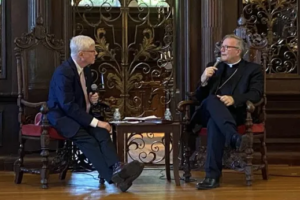CNA—Addressing a packed audience of approximately 1,000 on the campus of Harvard University on Sunday, Bishop Robert Barron offered those in attendance a window into the “Catholic intellectual tradition” by emphatically proclaiming: “The glory of God is man fully alive!”
The founder of the Catholic media apostolate Word on Fire, Barron is one of the most outspoken American prelates against the errors of “secularism” and its ever-increasing presence in Western society. Harvard, the first college established in the American colonies, was originally founded to train and educate Puritan clergy members in the New World and is completely secular today. 
Barron said in his lecture that secularism is a reaction to what others perceive as a “threatening God” but said that “the world is most itself when it has found a relationship to the supreme good, which is God.”
Barron, who serves as bishop of the Diocese of Winona-Rochester, Minnesota, spoke at the school’s Memorial Church, an interdenominational Protestant church dedicated in 1932.
Deacon Tim O’Donnell, executive director of the Harvard Catholic Forum — which co-sponsored the event along with the Harvard Catholic Center — said that “Harvard’s church” was the chosen destination for the lecture because it would attract “more non-Catholics, seekers, and inquirers” than St. Paul’s Parish, the Catholic church where Barron celebrated Mass and offered a homily earlier in the day.
Location of talk chosen with purpose
Memorial Church, O’Donnell explained, is better suited for the spoken word and also has a larger capacity. What’s more, its location was highly symbolic.
“We wanted to place Bishop Barron’s message about the Catholic intellectual tradition right in the center of the secular university, and in the center of Harvard in particular,” he added.
Bishop Barron’s Talk: Christ is THE Word
Barron began his talk by saying that the “most fundamental claim” of the Catholic intellectual tradition is that “Jesus Christ is epistemically basic.” In other words, Barron said, Jesus Christ is the “privileged lens through which the whole of reality is read.” That claim is not “imperialistic,” as some may think. Every intellectual system establishes an idea as epistemically (related to knowledge or the study of knowledge) basic, he added.
“He’s not presented to us as simply one prophet among many, one religious spokesperson among many,” the Bishop continued.
“Rather, we hear that he is the Word. He is Logos,” Barron said, adding that “the various sciences and perspectives have to be read from the standpoint of the Logos.” Looking through the lens of Jesus, some aspects of life are seen “more clearly” such as God, humanity, and creation, he said.
God is not competing with the world
God is not competing with the world, as was made evident when he took on human form, Barron explained.
“God and a creature come together in such a way that neither one is compromised. How’s that possible? It’s possible only if God is not a competitive being among many,” he said. “God is the sheer act of ‘to be’ itself.”
The closer God comes to humanity, “the more alive we are, the more ourselves we are.”
Moses’ encounter with God
Barron pointed to the prophet Moses’ encounter with God in the burning bush as an example. 
“How does Moses see God but in , which is on fire but not consumed? The closer God gets to creation, the more luminous and beautiful it becomes without being consumed,” he said.
No Humanism or Freedom greater than Christian theology
Offering what he called a “bold claim,” Barron said: “There is no humanism anywhere, East or West, anywhere across the ages, greater than Christian theology.”
Barron said that “divine freedom can come intimately close to human freedom and not compromise it, not crush it.”
Distinguishing between two views of freedom, Barron said the “modern sense” is that “freedom is fundamentally indifference in the face of the yes and the no.”
But in the “biblical sense,” freedom is “the disciplining of desire so as to make the achievement of the good first possible and then effortless.”
St. Irenaeus of Lyons: “The Glory of God is man fully alive”
Barron told the crowd that his talk could be summed up in the simple words of one of his heroes, the second-century bishop St. Irenaeus of Lyons, who said: “The glory of God is man fully alive.”
“That’s a God who glories in our being fully human,” he said.
Speaking on creation, Barron said that anything that exists apart from God has come “fully and utterly from God.”
If everything comes from God, it must “be marked” by “intelligible form,” he said.
He said “this is precisely why the modern physical sciences emerged out of a Christian university matrix.”
The Fullness of Truth
“It’s the theological doctrine of creation which teaches this truth that we should expect finite reality in every detail to be marked by intelligibility that makes the sciences possible,” he said.
Before answering several questions from the crowd, Barron concluded his lecture by saying that the Catholic intellectual tradition “stubbornly looks at God, the world, ourselves, and the way we organize our societies through the lens of Jesus Christ, and it sees them according to a divine light.”




You must be logged in to post a comment.